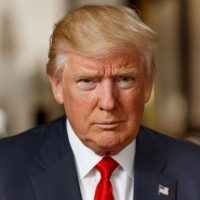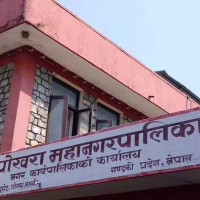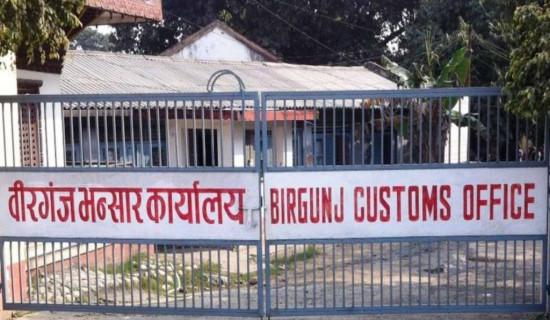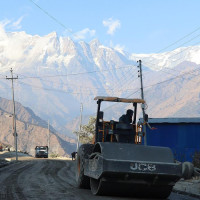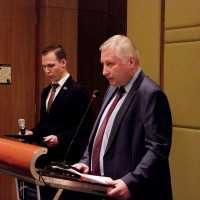- Tuesday, 23 December 2025
Govt focused on resolving challenges in federalism
The nation is marking the 9th Constitution Day on September 19. The almost one-decade period of the promulgation of new constitution with federal structure has witnessed its own difficulties and some exciting ups and downs over the years. Recently, with the formation of the coalition government of the two largest political parties-Nepali Congress and the CPN-UML-- constitution amendment issues have been in discussion among leaders and general public. Against all these backdrops, The Rising Nepal daily's Purushottam P. Khatri and Gorkhapatra daily's Lucky Chaudhary and Online edition's editor Narad Gautam talked to Minister for Communication and Information Technology Prithvi Subba Gurung, who is also the government spokesperson. Excerpts:
How do you assess the progress made over the nine years since the promulgation of Nepal's new constitution?
It seems to us that these nine years of implementing the constitution have been quite challenging. However, from some perspectives, it has also been positive. On the other hand, we noticed that in certain aspects we have been negligent, which has caused us difficulties. As we continue implementing the constitution, its positive and negative aspects, along with its strengths and weaknesses, become apparent. Therefore, the current government is moving forward with appropriate and necessary constitutional amendment plans.
In the context of the implementation of the constitution, compared to other countries, there are many positive aspects, especially for a country like ours that has faced political transitions and various challenges. However, when we look at the aspirations and needs of the people, it does feel like full implementation of the constitution has been somewhat delayed.
The main reasons for this delay include political instability, a weak administrative structure, and legal as well as structural challenges. To effectively implement the rights and responsibilities provided by the constitution, there is need of cooperation, coordination, and transparency between bodies ranging from local governments to the federal level.
What key achievements have been made following the successful promulgation of the constitution?
The first thing is that after the promulgation of the new constitution, the federal government successfully conducted the federal, provincial and local level elections twice. The governments of all three tiers have started operating in their own way.
As per the constitutional provision, the country has also elected president and vice-president as per its constitutional provisions and the formation of the constitutional bodies has also been accomplished accordingly within these years. Simultaneously, the infrastructure development works have also been moving ahead in their own way.
The seven province offices and ministries have also started drafting and introducing their respective policy programmes and provincial laws maintaining coordination with the federal government.
Whatever rights have been mentioned under the list of exclusive rights by the local and provincial governments by making one's own laws and running the administration to prepare budget seems to be a positive aspect of the implementation of this constitution.
What challenges have come up during the implementation of federalism in accordance with the provisions of the constitution?
Currently, two main issues are not being addressed according to the constitution. Firstly, the adjustment of Nepal Police in the provincial police cannot be completed due to the absence of a federal police law. Secondly, the federal civil service law has not yet been enacted, leaving the management of civil service, including recruitment processes and staffing, in a state of stagnation. Although, we brought inclusive civil service act, we still have to issue federal civil service law, and this has been creating confusion regarding specific number of deployment or recruitment of civil servants in the federal, province and local levels.
Another issue is that when implementing our constitution, there are lists of rights for the federal, provincial, and local levels mentioned in the constitution. Under these rights, there are lists of shared rights between the provincial and federal governments, as well as lists of exclusive rights between the provincial and local levels.
According to the lists of these rights, the process of creating programmes, implementing policies, and budgeting is still causing confusion among different layers of governments causing duplication and triplication in priority programmes and policies and budgeting. And this has also hampered the attempts to increase capital expenditure.
How is the current government addressing the problems and challenges associated with the implementation of the constitution?
Yes, the present government has been effortful to resolve such challenges. The present government has taken the federal civil service law and provincial police integration through federal police law in the respective parliamentary committees for endorsement before their tabling in the House of Representatives and National Assembly. Although, these efforts were also made by the erstwhile government, the present government has been committed to resolving the impasse soon.
The Administrative Committee under the Council of Ministers formed under my own leadership has also given some advice regarding management of civil service employees. In many offices and departments, there is a tendency of repetition and triplication of the same employee in the same office and the programmes they create for the ministry show repetition. This has been causing problem in all national, provincial and federal level policy and programme to implement them properly and timely.
And this administrative committee has suggested the federal government to make a taskforce to avoid duplication of the policy and programmes and budgetary provisions in each province, and local level.
What other steps do you think should be taken to fully implement the basic spirit of the constitution, namely federalism, republicanism, secularism?
After the constitution was promulgated, the way the lists of shared and exclusive rights among the federal, provincial and local levels were prepared has also created complications in the implementation of our constitution. The issue is that in a federal governance system when distributing powers among governments, where there are fewer shared rights and more exclusive rights, the chances of disputes are much lower. However, in our case, the list of exclusive powers is shortest, while the list of shared rights is longer. Looking at the list of exclusive powers of the provinces, there are currently about 21 or 22 such rights, but when it comes to the list of shared rights, there are no fewer than 35 rights.
That is why these issues always give rise to debate among the leaders and elected representatives of their constituencies while introducing laws. No proper attention and discussion could be made while finalising the lists of our powers for the province and federal governments. We should now show proper concern and manage these issues for the proper functioning of the three-tier governments.
The Nepali Congress and the CPN-UML inked a seven-point agreement to form the present government. Among the issues discussed were proposed constitutional amendments. Could you detail the specific issues that were considered for revision in the present constitution?
First of all, as of now, we haven’t considered the points to be amended in the constitution. But generally, the two largest parties have discussed the existing electoral system. Questions have also been raised regarding the rule of law or governance system. But I don't think the governance system will be brought under discussion for amendment by this government.
But it is obvious that there has been political instability in the provincial governments when the federal government falls. This tendency has also affected the provincial government. But, no such effect of federal government change has been seen in the local level government because our constitution has guaranteed their fixed service term for five years.
Meanwhile, there are other issues on the floor regarding the review in the first-past-the-post-system or direct electoral system and proportional representative system. But being the government's spokesperson, what I would like to clear that the government cannot backtrack from the proportional system.
Since the promulgation of the constitution, numerous changes have occurred in political, social, and representational spheres, and there is a noticeable sense of enthusiasm regarding development. However, certain segments of the public still remain dissatisfied. In your opinion, what measures should be taken to address these concerns?
Before talking about dissatisfaction brewing among the public, what our history has taught us during the global pandemic situation of COVID-19 that it’s the province and local level governments who helped and acted dedicatedly and promptly to save lives of common citizens. Many quarantines, food and temporary shelters were managed in a speedy way during the COVID-19 pandemic. These were a few good examples and presence and effectiveness of having the federal structure in Nepal. Had it there been no presence of such a federal structure, thousands of lives would have been lost untimely during such mega disasters. These are the true examples of the capacity of our federal structure.
Media is a witness of every political movement and change. However, it appears that media outlets have struggled to keep the public adequately informed. In this context, what measures do you believe should be taken to enhance effectiveness and organisation of state-run media?
Media, be it private or state-run, are the supporting pillars to national democracy. Media's role in ushereing political change cannot be ignored and forgotten anymore. For a nation to become strong, media that are run by the state also must be stronger which has been proven during the outbreak of COVID-19 pandemic and the Gorkha Earthquake in 2015. Nepal is that country which is still in the forefront of the community radio service in South Asia and in the sector of public health as well. Private media should not be afraid when the government backs the state-run media because we have let the private ones function in their own way and exercising full press freedom as per the constitutional provision.
In relation to the Ministry of Communication’s role in advancing the government's agenda for prosperity, you have earlier mentioned the necessity of Nepal's own satellite, security printing press, and the fullest use of the digital economy. How can we promote the digital economy in a way that engages and benefits the youth?
The Prime Minister’s Office has instructed us to achieve 3 per cent of the total gross domestic product (GDP) through the digital economy.
To meet the set target, the Ministry has now focused on widening the use and application of digital activities, controlling corruption through digital technology, ending the practice of seeking commission, widening the area of revenue collection, and contributing to national production through the right use of digital technology.
When this happens, the digital sector can also contribute more to the GDP and achieving the 3 per cent target would not be that difficult. Not only this, we are also planning for the official use of AI for the promotion of tourism, modernisation and mechanisation of agricultural sector of Nepal. We are also evaluating the impact and influence the AI can create and assist in the government's Digital Nepal Framework programme which is about to be implemented again after going through police change . We have been developing policy for the use of AI, and other social networking media like Facebook, Twitter, and WhatsApp. Another important factor that may contribute to nation's digital economy is operating security printing press within the country. What I personally do commit here from this forum is that by the next fiscal year, except printing of Nepali currency, the security printing press office will start publishing and producing our own postal stamps, smart driving license cards, national IDs, passports, citizenship certificates and stickers of excise duty.
There is a growing concern about the lack of political stability and fixed term in the government. Although the ruling parties represent two different political ideologies, can we expect the current government to remain stable until 2027 AD?
Being the government's spokesperson, what I can say is that there is a clear seven-point agreement between the Nepali Congress and CPN-UML regarding sharing power and turn-wise leadership in the government and by the next general election till 2027, the present government will move ahead without deviating this side and that . And this has been done because of today's necessity and demand. If the people's trust in and hope from parties are shattered, it becomes difficult to govern the country and maintain the political system. This government has also been formed to give permanence to the government till next election and keep the public faith intact.
Lastly, as the future of the nation rests on the youth, what message would you like to convey to them on the occasion of Constitution Day?
What I would like to request to Nepalis living both in the country and abroad is not to be swayed by anything, to look towards our own nation and homeland, to remember the place where we were born, and to observe what we are doing and what others are doing around us. We, the leaders, are trying to build the country, but the effort has not been enough. Let us prioritise the nation in our work and move forward. Let us work within the country, create a working environment, and contribute to nation-building. The ones who drive a country forward are leaders with a dynamic constitution and leadership capabilities. Understanding this, let us all move forward with a positive mindset.




